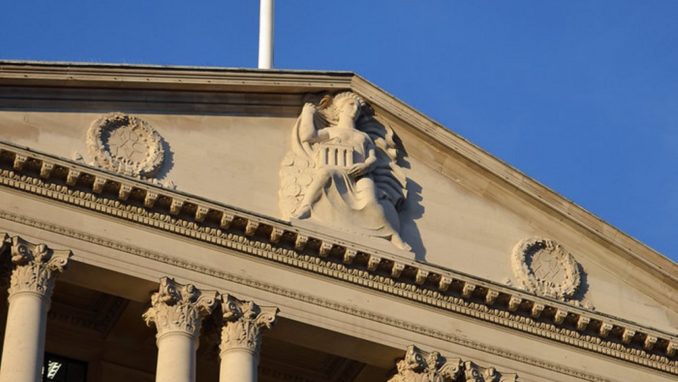
“When the tide goes out you discover who’s been swimming naked”. Thus spake the sage of Omaha, Warren Buffet.
When government ministers are floundering, manifestly out of their depth, you know, despite all official protestations, they are swimming naked. But only when the tide goes out is the full extent of their unfitness for any office of state revealed.
The unintelligible, confused and self-contradictory Covid-19 messaging has become laughably baseless – yet that matters far less than the wider economic malaise it so faithfully reflects. We are being governed by a bunch of pretentious busybodies scurrying for an escape route from the morass they themselves have witlessly engineered. The economic tide is well and truly out.
Public reckoning is overdue
When the virus struck, the new Chancellor’s indulgence with the public purse was duly praised. He acted as a national saviour with shedloads of printed money and an uncosted furlough guarantee scheme scheduled to end in October. But even if warranted as an emergency measure, what will happen after October? Already there is political wavering about ending the furlough. But what about the post-lockdown economic reckoning? Hardly mentioned in polite society is the inevitable spike in unemployment that will exceed the state’s capacity to fund any compensatory benefit.
This unpalatable truth is lost on most of the 50 per cent of our adult population on the state’s payroll, and whose jobs are relatively protected from the financial tsunami that’s coming. When you next converse with someone in the public sector you could quietly ask who pays their wages. If their response includes words like “department”, “council”, “government” or “service”, you might point out their salaries can only be borne by the taxed earnings of private sector workers. If their terms entitle them to an “inflation-related” rise, that increase has to be contributed by tax-producers. But they may not grasp that unforgiving logic.
The lockdown is more destructive than the virus
Friends tell me we should acknowledge the government’s plight and cut them some slack. This is what I keep hearing: “The virus was unprecedented; it struck so suddenly, without warning; they did their best in impossible circumstances”, and so on.
Well, no. That special pleading perfectly describes a leadership vacuum – a situation in which officialdom has lapsed when confronted by its greatest challenge to date. The emperor truly has no clothes.
The financial crisis that confronts us was spawned – not by Covid, but by the remedies selected and applied by our public servants. Consider the evidence: (a) the frenetic bout of debt purchasing (simply the mechanism for money-printing) has caused our national debt to exceed 100 per cent of GDP, while (b) the FTSE-100 index of leading stocks is in “bull market” territory, up more than 20 percent since Britain went into lockdown. Paradoxical? It’s no surprise at all, because (a) above is the efficient cause of (b) – equity markets being the refuge of choice for investors with more money than sense.
A reminder: how it all began
A brief historical recap: quantitative easing (QE) was initiated by the Bank of England as a temporary expedient in 2009, with a modest rescue fund of £50 billion following the collapse of Lehman Brothers. But surely you remember Barron’s Law? “Any government that can print money, will print money”. The QE drug was never limited to the £50 billion set aside. It escalated into an uncontrolled credit expansion of £450 billion over the following decade. As Liam Halligan puts it: “QE is now the economic equivalent of crack cocaine”!
Its handmaiden is the contrived level of near-zero interest rates – some depositors even having to pay for the privilege of lending their money! Thus do the natural laws of economics appear to have been suspended, some 20 per cent of all global debt now carrying a negative yield – a cause of massive malinvestment.
With the UK’s national debt ballooning to £745 billion and the Bank of England buying “gilts” at double the 2009 rate, neo-Keynesians are getting all the QE-induced “demand stimulus” they could ever have craved – no matter that it exceeds 100 per cent of GDP! Axiomatically incapable of distinguishing cause from effect, Keynesians consider the government’s debt servicing costs are now eminently manageable.
Money supply and the price level
But when economic law appears to have been suspended you can be sure it will reappear with a vengeance! When the City-slickers who first get their mitts on the latest tranche of QE fakery have maxed-out on buying yachts, Ferraris, vintage claret, Mediterranean villas and inflating the price of every Bond Street bauble, the new dosh filters down into prices of mundane “necessities” – things that ordinary people need for day-to-day living.
Unprincipled actions are invariably followed by unintended consequences: the creation of all that new money exerts pressure on commercial banks to do something with it. Lending it to businesses desperate for funding allows banks at least some scope for negotiating interest rates – certainly preferable to buying bonds with a return of zero or worse. But the greater the quantity of cheap money searching for a home, the less diligent is the selection process. Much of it is applied to support over-indebted, nigh-insolvent businesses – more destructive malinvestment, stifling genuine growth.
Consequences of malinvestment – and don’t believe the statistics
This results in commercially unviable over-production that finishes up in “pound-shops” and “charity shops” that litter the once-bustling High Street, as well as all the “food-banks” that can’t get rid of the thousands of loaves produced by bakers paid by the state to keep up an uneconomic production line.
This process spreads across the broader economy against a backcloth of retarded production. It must perforce translate into higher prices, thereby completing an inexorable “wealth transfer”, impoverishing those least able to absorb the higher cost of living. If only social reformers had the intelligence to focus on causes, rather than blindly attacking manifestations!
Government statisticians will juggle the contents of their consumer baskets like crazy to contrive their targeted 2.5 per cent – but here’s another timeless gem: you can’t fool all the people all the time. Citizens don’t need a CPI index to tell them that the price increases they face, every day, are totally out of control.
What should they do?
I’m always asked what, instead of perpetuating this grotesque charade, the government should do. Well, for starters, that’s the wrong question. It’s more a case of what they should stop doing!
It’s always easier to identify the destination than the route. The QE-dependency drug-habit must be broken by prohibiting the purchase of more government debt. The chancellor will have to close his ears to howls from the opposition ranks in Parliament, the Bank of England, treasury, hedge funds, private equity, pension funds, insurance giants, charitable quangos and banks – all desperate for liquidity. The monetary frenzy must be allowed to subside, and financial markets left to cool down while returning to their traditional role of risk-assessment of investment opportunities.
Weaning process – and some reflections on currency
The inescapable weaning process that disentangles over-indulged welfare dependency from the poison it craves, is painful but essential. It has several facets. For example, a rise in the cost of living usually reflects lost purchasing power. I’m not talking about exchange rates. These hardly vary, given that all the world’s major currencies are being subjected to the same money-printing debasement processes at an equally breathtaking pace. Look, instead, at what your money can buy.
Coins of the realm are now useless for anything beyond parking meters and candy bars; the notes are smaller and feel synthetic; you pay the pharmacy the same amount for a pack containing fewer pills; soup cans are smaller; there are even fewer matches in the box. Yet the price edges up every week – it’s inflation of money and deflation of what you get for it.
We are not yet on the Weimar Express, but once this process starts, watch out. A dozen eggs that cost a half-Reichsmark in 1918, were priced at 4 billion Reichsmarks in October 1923, by which time the largest note in circulation had a face value of 120,000 trillion Reichsmarks, at which point the government was compelled to face up to its own extinction.
Reality dawned
In late 1923 the German Reichsbank ditched the worthless Reichsmark and Finance minister Hans Luther came up with the Rentenmark (“rente” meaning mortgage), consisting of bonds linked to the land of Germany – although it was necessary to suspend all legal tender laws to facilitate this. The psychological secret, of course, is that land is in fixed supply and cannot be inflated by money-printing. Within months the next practical step was taken – the Rentenmark was formally indexed to the value of gold – though it could not be redeemed in gold because the government had no gold reserves. One Rentenmark was initially valued at one billion ‘old’ Reichsmarks while foreign exchange was pegged at 4.2 Rentenmarks to one US dollar, which was also linked to gold.
Few saw it coming, but it came!
The adjustment was desperately painful, the personal wealth of millions having evaporated from the face of the earth, virtually overnight. But it was both necessary and, ultimately, successful. Commercial activity between relatively debt-free businesses picked up rapidly; both domestic and foreign lenders demonstrated their faith in the new currency and capital formation resumed its proper role.
It’s easy to miss two of the most salient lessons of this salutary historical drama: first, freed from central bank meddling interest rates will naturally revert to measuring time preferences for accessing money; and secondly, people don’t need to be instructed on the subject of trading media: Germans, and those they traded with, latched on to the Rentenmark because they trusted its durability as an inflation-proof store of value – not because it was state-certified legal tender, which of course it was not.
Our path out of the current mess necessitates abolition of legal tender laws designed to force people to employ an increasingly worthless medium. Far better to allow a private innovator to mint a commodity-based medium that gains traction, and trust, because of its intrinsic worth.
© Emile Woolf August 2020 (website)
The Goodnight Vienna Audio file
Audio Player



